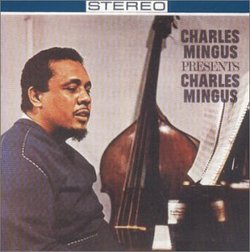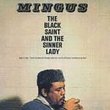| All Artists: Charles Mingus Title: Charles Mingus Presents Charles Mingus Members Wishing: 5 Total Copies: 0 Label: Candid Records Original Release Date: 1/1/2000 Re-Release Date: 10/24/2000 Genres: Jazz, Pop Styles: Avant Garde & Free Jazz, Modern Postbebop, Bebop Number of Discs: 1 SwapaCD Credits: 1 UPC: 708857900527 |
Search - Charles Mingus :: Charles Mingus Presents Charles Mingus
 | Charles Mingus Charles Mingus Presents Charles Mingus Genres: Jazz, Pop
This is perhaps the most cohesive set Mingus ever made, recorded during a crisis of personnel in 1960. After many months with Mingus, Eric Dolphy and Ted Curson had decided to leave. These sessions and a few to follow for ... more » |
Larger Image |
CD DetailsSynopsis
Product Description This is perhaps the most cohesive set Mingus ever made, recorded during a crisis of personnel in 1960. After many months with Mingus, Eric Dolphy and Ted Curson had decided to leave. These sessions and a few to follow for Mingus and the Jazz Artists Guild were to be their last tie with Mingus. He decided to set the mood that might resemble a night in the club, hence his announcements on the recording and the reason he wanted the lights turned out during the recording. In these sessions, everyone reached and maintained that level of daring to make their instruments become extensions of themselves. Similar CDs
|
CD ReviewsGreat performances, poor sound Scott Richardson | Chicago, IL USA | 09/23/2003 (5 out of 5 stars) "Although the sound on this CD is less than great, to give it less than 5 stars would be a crime. The performances here are fantastic. At the start of the CD, Mingus tells the audience not to talk, clap, ring the cash register, or rattle the ice in their glasses. The first time I heard this intro, I laughed. Now I realize that Mingus was setting the stage for a band whose utter and complete concentration was essential for their performance. Any outside intrusion could throw them off. The music ranges from simple and beautiful to satirical and enraged (the vocal version of "Original Faubus Fables" is a treasure) to utter chaos, but Mingus somehow steers his band clear of any obnoxious free-jazz indulgence.I initially picked this disc up desperate to hear more Eric Dolphy, and I was not disappointed. His solos and interplay with Mingus, Richmond, and Curson are fantastic.In short, if you are a Mingus fan or a Dolphy fan and you don't have this disc, you're really missing out." No Applause you might disturb the band! Stalwart Kreinblaster | Xanadu | 01/19/2006 (5 out of 5 stars) "Charles Mingus - truly one of a kind...This album is one of his best as far as improvisation goes..Eric Dolphy and Ted Curson are on fire! Mingus also delivers some inspired playing..and the general sound of the group is very free..which contrasts nicely with Mingus' airtight compositional style. I would also like to recommend his album titled 'Mingus' also on the candid label (in fact all of Mingus' work during this period is phenomenal)." Mingus Upfront directions | Space Time Foam | 06/30/2006 (5 out of 5 stars) "Charles Mingus during his lifetime bristled at his music being labeled "free jazz". However, his unique style and changes in tonality obviously were highly influential on later free jazz musicians. Also taking the influence of the big band sound and making it dissonant certainly was noted by later musicians. What put me off from listening to this cd at first is the fact that Mingus speaks during some of the pieces. However, his "introduction" to the pieces, as if an audience were there is a hilarious parody of live jazz albums where the musicians feels like they have to "explain" each piece. Also his take on racism, "Original Fauvus Fables" was powerful for its time. Spoken word over free jazz albums became more common after this, eventually culminating in the Last Poets, a proto-rap group. Charles Mingus' band with Eric Dolphy was not only his best group, it is one of the greatest jazz groups of all time. It still sounds contemporary and is jolting, not aimless jams but a fully focused sucker punch."
|

 Track Listings (4) - Disc #1
Track Listings (4) - Disc #1